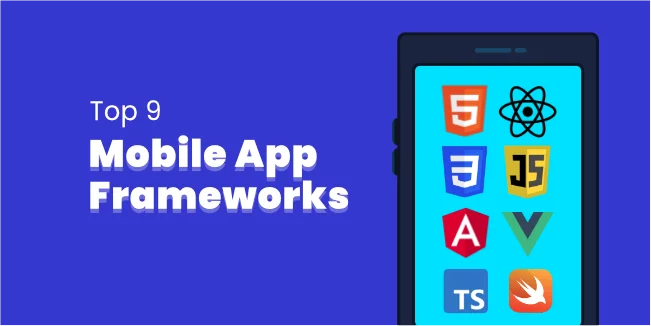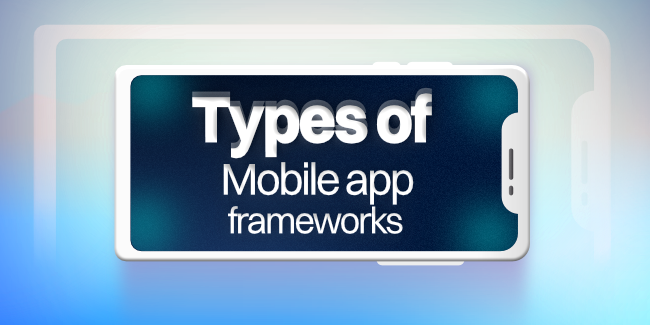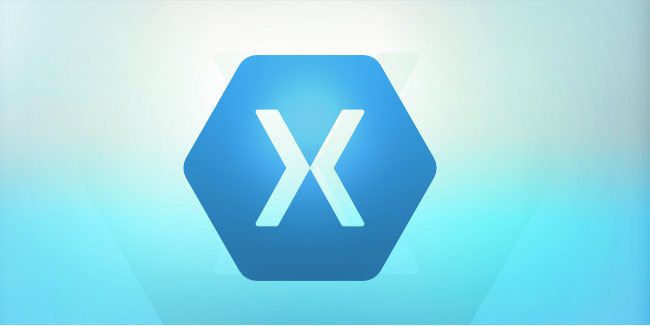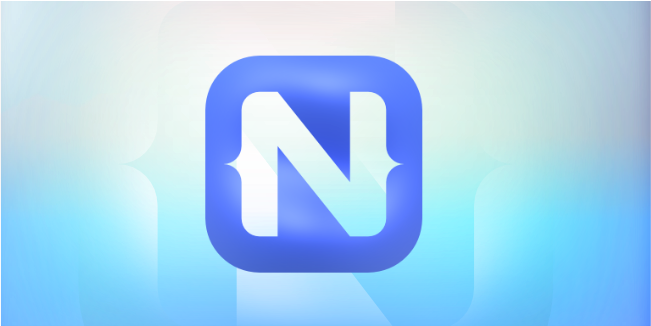Mobile Development
Technologies
Top 9 Mobile App Development Frameworks in 2022

Mobile applications are created practically every day. Every now and then, someone comes up with the idea of making their vision a reality by opting for mobile application development. A huge amount of ideas means a huge amount of needs, and to meet them, dedicated technologies are created that facilitate work and create your dream software.
Due to the large selection of technologies, it is not easy to choose the right one at first glance. That is why we have prepared the article "Mobile App Development Technology Stack - What's the best? How to choose one?" in which we answer the most common questions about choosing the right technology for custom mobile app development.
It is much easier to choose the right technology, like a framework, when you know what it is characterized by and its purpose. It is amazing how many possibilities there are in choosing the right tools to create exactly what we have come up with and planned. Regardless of whether you choose native app development or hybrid app development, you must choose the right framework to make it happen.
As it is mainly thanks to frameworks that we can create our dream custom mobile apps, in the article below, we present to you 9 of the best frameworks, in our opinion, that you have at your disposal.
What is a Framework for Mobile Apps?
Knowing the basis of a framework will make it much easier for you to understand its use in mobile app development. We have prepared an article, "What is a Framework?" about the framework itself. From it, you can find out exactly what the framework is, what it is made of, and what its types are.
When explaining a mobile app framework, start with the fact that you don't need to know any complex programming languages to make an app. There are various app development frameworks for iOS and Android. All you need is a firm grasp of web-based programming languages, such as HTML, CSS, or JavaScript.
Another approach to characterize these structures is a minimal structure that allows you to enhance your code according to specific code and creates a long-term framework for bespoke mobile application development.
Types of Mobile App Frameworks

Today, mobile app development frameworks have several built-in features, such as speed, efficacy, and a clean environment. The framework utilizes pre-built components, including compilers, debugging tools, and a toolkit to run the application on the target device using the business's code.
Before choosing the best framework for mobile app development, you should incorporate essential criteria. Development speed, range of applicability, manageability, and flexibility are the most basic requirements you need to consider in terms of which are most important to you.
These requirements are met more or less by various types of frameworks. It's like motorcycles. Some are fast but not very comfortable, others are incredibly comfy, but there is no point in racing them. There are also universal bikes that do everything right but not in a perfect way. It is the same with types of mobile app frameworks.
Mobile app frameworks come in different shapes and sizes. We're not speaking about specific app areas like purchasing or games. However, in terms of how applications work on a smartphone, mobile frameworks may be divided into three categories.
Native Apps
These frameworks are used to develop native mobile app development for a specialized platform. They are generally built to meet the demands of a specific operating system (OS), such as Windows, iOS, or Android.
Web Apps
It's a framework that aids in creating smooth web app development for web API, web server, and web service interfaces. It's referred to as a framework or a platform for different web apps.
Cross-Platform Apps
Some frameworks are dedicated to hybrid app development and can be used to make cross-platform mobile apps. It possesses the abilities of both native and web development frameworks.
The Best Mobile App Frameworks
Now that we've covered all of the fundamentals of app frameworks and how they influence your entire software development lifecycle, let's look at some mobile app development frameworks for consideration for your 2022 projects.
One more thing before our list. If you don’t know what software development lifecycle is toy should know that it is a process full of phases of specific actions that cannot be explained in a few sentences. Fortunately, we have prepared an article about the software development life cycle from which you can learn what the phases are in it, what they contain, what is the goal of SLDC and much more.
Now that the most important things are clear let's move on to the list of our top 9 mobile app development frameworks.
Flutter

Flutter is a free and open framework from Google that allows you to create native Android and iOS applications with minimal code. It's a ground-breaking SDK for cross-platform app development that distinguishes it from the competition because it uses a unique method to produce native apps. It's an unequaled and reliable smartphone user interface platform that speeds the development of appealing programs.
Flutter is a mobile application development framework with a rendering engine, debugging and integrating APIs, and resources that allow developers to create and distribute impressive-looking mobile applications. It has been used by several well-known organizations, including Google and Abbey Road Studios.
Features
- Great Development Speed
- Cross-Platform Apps
- Appealing Visuals
Purpose
You can use Flutter development services to create apps for various devices, including desktops and mobile devices. It is an excellent tool for designing custom, adaptive layouts for your mobile apps. Many mobile app developers praise the flutter for a real-time preview of the app's performance.
Flutter Based Apps
- Postmuse
- Google Ads
- Hamilton
Xamarin

Xamarin is a cross-platform mobile application development framework that enables developers to create apps for Android and iOS. Because they're written in the C# programming language, they require less code than those developed in other languages. As a result, the process of coding is quicker. Also, it allows us to rapidly transfer the scripts across different systems, such as Windows and macOS.
You may assume that faster development implies sacrificing quality and construction when you consider how much quicker it is to create an app these days. However, Xamarin-based applications have the perfect native capability of quality and efficiency. As a result, it's an advantage in application creation and productivity since it works with Microsoft Visual Studio.
An intermediate layer in Xamarin controls the connection between the core system code and standard code. Programmers may develop an API-rich, backend-based, component-based, or other environments with APIs, backends, components, and more using tools, frameworks, and languages backed by a thriving community. Xamarin enables you to create native iOS, Android, WatchOS, tvOS, Windows, and macOS apps.
Features
- Google Emulator Manager
- Android SDK Manager
- Rapid Advancement
Purpose
You can use it to develop mobile apps with native behavior and create cross-platform applications in C# using Visual Studio. It's commonly advised for projects with a custom user interface system, code sharing, or business logic.
Xamarin Based Apps
- CA Mobile
- The World Bank
- Novarum DX
Ionic

The Ionic framework is a free, open-source project developed with Apache Cordova and Angular that allows developers to create Android and iOS apps for optimum mobile performance. Ionic helps develop the mobile app by creating robust and feature-rich native applications.
The most significant advantage of Ionic is that it enables developers to utilize a variety of user interface components, such as filters, forms, views, navigation menus, and action sheets in their app design.
Ionic is a comprehensive tool that may be used to create Progressive Web Apps (PWAs), hybrid mobile applications, and cross-platform mobile apps. Furthermore, it offers its command-line interface and a variety of additional built-in capabilities such as Ionic Native, Cordova-Based App packages, etc.
Features
- Slow Loading
- Ion-Searchbar
- Ion-Ripple Effect
Purpose
You can use Ionic services to create mobile applications without using professional native developers. Ionic can be used to create dynamic and hybrid progressive web apps (PWAs) and cross-platform applications. It would be a good choice for developers with prior experience in different JavaScript and Angular libraries.
Ionic Based Apps
- MarketWatch
- McLaren Automotive
- Diesel
Apache Cordova

Formerly known as PhoneGap, Apache Cordova is a famous developer-friendly mobile app development framework. It's a cross-platform application development framework that builds mobile applications using CSS3, HTML5, and JavaScript.
The Cordova plugins allow developers to utilize smartphone hardware features such as GPS, cameras, and accelerometers to provide a native-like experience. The significant features of Apache Cordova are a faster development approach with a single code and a third-party application management tool.
Features
- Command Line Interface (CLI)
- Cordova Plugins
- A Single Source of Code
Purpose
It is convenient when quick prototyping is the need of the hour. It can be utilized to deploy web applications on different app stores, combine native app components with WebView, and access device-level APIs.
Apache Cordova Based Apps
Native Script

It is another example of open-source mobile development frameworks. It's popular because it helps speed up app load times and cut down on development time. This framework is skilled in developing Typescript, CSS, Vue.js, Javascript, and Angular-enabled mobile applications.
Big corporations choose Native Scripts because it has features like backend support, business support, full access to iOS APIs and Android, cross-platform app development, and native user interfaces without web views. The NativeScript framework's APIs are similar to those in Xcode or Android Studio. The framework allows you to develop Android and iOS applications from a single source code.
One of the biggest reasons this framework is popular in developing mobile apps is that developers don't have to repeat themselves by writing different web and mobile codes since they can utilize the same code on both platforms.
Features
- Fast Loading
- AndroidX Support
- Code Sharing
Purpose
It is recommended for cross-platform applications and offers comprehensive backend assistance. You can reuse existing tools and code to develop quick prototype apps.
Native Script Based Apps
- Strudel
- BitPoints Wallet
- Daily Nanny
React Native

React Native is a cross-platform development framework that organizations have used worldwide to create mobile apps. The libraries of React Native offer a fast and consistent development experience for Android and iOS apps. They are embedded with JavaScript code, making app creation for Android and iOS much easier.
React Native's major appeal is speeding up the development and deployment process. React Native has several more features, including reusable components, engagement with third-party plugins, and component-based front-end app creation.
Features
- Low-Code
- Components Recycling
- Third-Party Plugins
Purpose
Because it saves time, effort, and capital, your developers can use React Native development services to make an app for many different platforms at once. It lowers production costs, and the time saved can be used on code development. It can also serve as a tool to transform a website into an intuitive mobile application.
React Native Based Apps
- Instagram
- Soundcloud
- Airbnb
Kotlin Multiplatform Mobile

It's an SDK that makes multi platform mobile app development super easy. This multi-platform technology is based on a single code, allowing you to construct high-end apps that work on Android and iOS devices. It implies that you can write platform-specific code for specific use cases, such as creating a native user interface.
There's no need to introduce any new programming languages to your codebase for it to be cross-platform with KMM. You can make your existing Android app function on iOS devices without modifying much of it.
JetBrains created Kotlin for Java Developers, a variant of the JVM that runs on the Android platform. Google has sponsored and encouraged the development of Kotlin, which is free and open to anybody who wishes to participate. It means many people who can support you during your development.
Features
- KMM Android Plugin
- Cocoapods Integration
- Kotlin/Native Debugger
Purpose
The primary purpose of Kotlin is the ability to share code between mobile platforms. You can share code across all platforms (JS, JVM, and so on) used in your project and take advantage of all native capabilities. You can also build a connected app where the logic may be reused across both the server and client sides.
Kotlin Based Apps
- Target
- SuperAwesome
- CashApp
jQuery Mobile

jQuery Mobile is a mobile app development framework that allows you to code platform-agnostic apps with complete compatibility across all devices. This framework creates flexible web portals that may work on various platforms, including smartphones, tablet computers, and PCs, utilizing JavaScript and HTML.
The HTML5-based structure and Theme Roller are used by jQuery Mobile to create highly flexible themes for online and mobile applications. It's one of the most popular mobile app development frameworks with customizable templates. It also supports Firefox on Windows, MacOS, Android, and iOS. There are two kinds of jQuery Mobile: a customized framework and a stable version.
At the cost of a slight decrease in performance compared to professionally written code in unsupported JavaScript, it allows you to achieve interesting animation effects, add dynamic page changes, and perform AJAX queries. Most jQuery-based plugins and scripts work on pages without requiring any changes to the HTML code.
Features
- Theming & UI widgets
- Accessible Rich Internet Applications (ARIA)
- Limited Size
Purpose
The use of jQuery with advanced features is highly encouraged for building various sorts of list views, buttons, form elements, toolbars, and other advanced functionality. This framework is irreplaceable when you want to create apps with UI enhancements accessible to all.
As jQuery is just taking your html5/css3/jquery content and the phonegap javascript library and creating an app that is just one fullscreen webpage pulling from the included content, we didn't cover any apps made with the use of jQuery.
Framework7

The latest version of the vue.js JavaScript library is Framework7, a lightweight and easy-to-use framework. It is an open-source development framework that assists developers in creating future-ready web, desktop, and mobile native-like applications. Framework7 makes the development process easy, convenient, and fast. It owes its popularity to its ease of use.
Framework7 extends support for Vue.js, React, and Svelte in some helpful ways. Framework7's user interface, in particular its distinctive UI elements such as action sheet, list view, popup, side panels, layout grid, and so on, is another noteworthy element.
Features
- Easy To Work On
- Built-in Grid System Layout
- Pre-Styled Widgets
Purpose
Framework7 is perfect for building hybrid web apps or mobile applications for iOS and Android devices. Its fast loading time can also come in handy when you are pressed for time. And if you're interested in more than the framework itself, Framework7 offers an enhanced ecosystem with templates, icons, and plugins.
Framework7 Based Apps
- PricePoint
- My Shopper
- GoDial
Conclusion
Choosing the appropriate mobile app development framework from among all of the options available on the market is a critical step in achieving a successful mobile app development process. Understanding your ultimate goals and what you want to accomplish with your choice can assist you in generating positive results.
The platform on which a mobile application is built has changed continuously over time, from a single platform mobile app to a cross-platform mobile app. With such a shift, the mobile app development trends are seeing a significant transformation in platforms, scripts, code, method of development, integration, and deployment.
By reading this article, we hope that you'll have a better idea of which mobile app development framework is best for your project. If you still don't know what framework is for you, Contact Us! We offer free consultation and estimation.